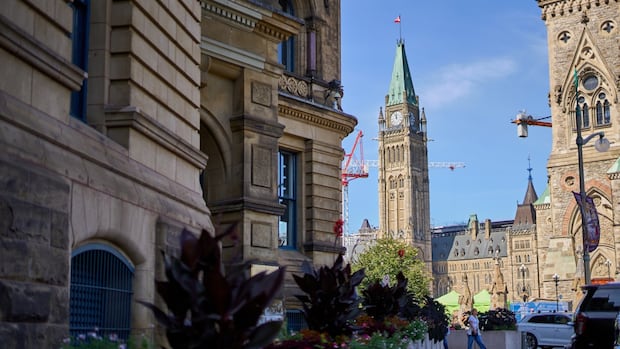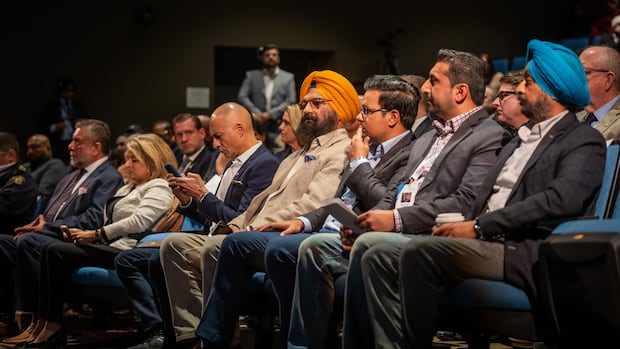MPs will be back on Parliament Hill on Monday for the first time since June as the House of Commons opens its fall sitting.
The House of Commons has been fairly quiet through 2025, with MPs only sitting for a few weeks in May and June after Parliament was prorogued and the election called earlier in the year.
Despite the shortened spring sitting, some key pieces of government legislation passed with the co-operation of the Conservatives.
But the fall sitting could shape up to be quite different. Here is what to expect as the House of Commons opens on Monday.
Government priorities
Prime Minister Mark Carney told his caucus last week that the spring sitting had been “all about action” and said the government needs to keep going. He listed a number of priorities, but said his key focus is the economy.
“We’ve relentlessly focused on our core mission, which is to empower Canadians by building Canada’s economic strength,” he said.
Those comments come amid signs of economic headwinds. The unemployment rate rose to 7.1 per cent in August while the Canadian economy lost 66,000 jobs, according to Statistics Canada.
As Prime Minister Mark Carney tells Liberal MPs it will be important for Canadians to ‘put aside our differences and focus on the things we can control,’ the Power Panel discusses Carney’s speech and looks ahead to the politics around the major project announcements expected on Thursday.
The biggest item on the fall agenda is Carney’s first budget, which is expected to drop sometime in October.
Typically budgets are brought forward in the spring but it was pushed back after April’s election. They’re also confidence votes, meaning the Liberals will need another party to either support their financial measures or abstain — otherwise the government would fall.
Carney and Finance Minister François-Philippe Champagne have asked ministers and departments to find “ambitious savings” and cut regulations.
“We made a clear commitment to Canadians to bring a new fiscal discipline to the federal budget. These are tough times. We have to make tough choices for a better future,” the prime minister said last week.
On the legislature front, some bills that were introduced in spring are still on the floor of the House of Commons.
Carney specifically mentioned the border bill, C-2, during his address to the Liberal caucus last week. But that bill is facing pushback from immigration advocates — who say it would put asylum claimants at risk — and from privacy advocates worried about the bill allowing the police to demand subscriber information from internet providers and other online companies. Both the NDP and Conservatives have spoken out against C-2.
Other bills left over from the spring include C-3, which would restore citizenship to “lost Canadians,” and C-8 which addresses cybersecurity.
Justice Minister Sean Fraser said Thursday in Edmonton that the government is prepared to collaborate with Conservatives on criminal justice reform. This comes after Conservative Leader Pierre Poilievre criticized the minister and said ‘a majority of Canadians’ now fear living in the country due to crime rates resulting from Liberal policies.
The Liberals are also expected to bring in legislation to tighten up bail provisions — something provinces and Conservatives have been pushing. Justice Minister Sean Fraser said other criminal justice reform legislation will also be tabled this fall.
Carney told caucus that the government will announce a “climate competitiveness strategy” in the coming weeks, as he shifts away from key environmental policies introduced under Justin Trudeau.
Poilievre in the House
One key change from when the House adjourned in June: Conservative Leader Pierre Poilievre will be back in his seat across from the prime minister in the chamber this fall.
The Opposition leader had to watch from the wings during the spring after losing his seat in April’s election. But his absence has been brief as he regained a seat in a byelection last month.
Poilievre took a collaborative tone on the first day of the spring sitting, indicating that his party would support some policies where they could find common ground with the Liberals. The Conservatives voted in favour of a tax cut and the Liberals’ major projects legislation.
But now that the dust from the general election has settled, the Conservatives are refocusing their message and pushing their own priorities. Speaking to his caucus on Sunday, Poilievre signalled that the party will be taking a more critical look at the Liberals’ record and policies.
“We want for the country to succeed. And that’s why we need to take a very careful look at Mr. Carney’s many promises and compare them to the results. Do the words match the deeds?” Poilievre said.
Poilievre lambasted the prime minister and argued he’s failing to address affordability issues and stifling economic growth by not moving fast enough on major resource projects.
On several occasions throughout the summer, Poilievre has called on the Liberals to “steal” his ideas. In an open letter to the prime minister last week, the Conservative leader outlined his priorities for the fall, which included cost of living, jobs, crime and immigration.
Poilievre has made a number of policy-related announcements this summer, including a promise to introduce a “Canadian Sovereignty Act” that would enact a number of Conservative campaign promises.
They include: repealing Bill C-69, what former Alberta premier Jason Kenney dubbed the “no more pipelines act”; scrapping the West Coast oil tanker ban; killing the industrial carbon tax; eliminating the electric vehicle mandate and reversing the single-use plastics ban.
Poilievre has also said he wants the temporary foreign worker program scrapped and the clean fuel standard repealed.
A new report from the Canadian Mortgage and Housing Corporation finds housing starts across Canada’s seven biggest cities have been flat — despite an election promise from the Liberals for them to double. Conservative housing critic Scott Aitchison says the ‘real problem is the cost of government.’
Last week the Conservative leader called on the Liberals to enact his housing plan and also said his party would introduce its own bail reform bill this fall.
The Liberals are moving on certain items Poilievre has highlighted, but likely not in a way that will satisfy the Conservatives.
Beyond the policy priorities, Poilievre appears to be preparing to take a more critical tone as he retakes his seat as leader of the Opposition.
In the spring, the Liberals and Conservatives showed that they could sideline the smaller parties and move things through Parliament quickly. If Conservatives aren’t happy with what the Liberals put forward this fall, the governing party will be forced to look for other dance partners.
A Bloc to lean on?
The Bloc Québécois has a smaller caucus than it did at this point last year, but with 22 seats in the House they could have some sway over the Liberals.
Speaking to his caucus ahead of a planning session last week, Bloc Leader Yves-François Blanchet joked about bringing down the government before laying out some key concerns he has about the prime minister’s agenda.
“Rather than tackling trade and tariffs, Mr. Carney’s government is wallowing in the Western Canadian oil fantasy by promising infrastructure projects as much as possible by stepping on provincial and Quebec jurisdictions,” he said in French.
Bloc deputy House leader Alexis Deschênes told CBC’s Power & Politics last week that the party is willing to compromise with the Liberals when necessary. But he said that the governing party needs to meet them halfway on certain issues, specifically when it comes to October’s budget vote.
“We’re not coming [to Ottawa] to be a party who will [just] support the Liberals. If we can discuss [priorities] maybe it could happen,” he told host David Cochrane.
“But on the budget they should not take our vote for granted.”
Some of the priorities Deschênes listed include boosting Old Age Security payments for seniors between the ages of 65 and 74 — something the Bloc pushed for last year — housing affordability and protecting supply management in trade negotiations.
Deschênes also emphasized that the environment will be a significant issue for his party.
“We don’t like what we’re hearing from the government now, with all the positions that they’ve changed,” he said.
As opposition parties prepare for the return of Parliament next week, Bloc Québécois deputy house leader Alexis Deschênes tells Power & Politics the Bloc will support the government’s major projects as long as they are ‘not about oil.’
Carney recently announced a pause to — and review of — the electric vehicle sales mandate. The prime minister also appears to be waffling on the government’s 2030 emissions reduction target.
“It seems we will be the party that will be saying ‘Yes, climate change still exists and we need to be responsible for that,'” Deschênes said.
The Bloc voted against major projects legislation in the spring. Deschênes said his party supports infrastructure projects but — in a position diametrically opposed to the Conservatives — is against expansion of oil projects.
“We fear that [the Liberals] will come with more pipeline projects. We don’t think that’s the way to go,” he said.
On a more procedural front, the Bloc also holds a bit more sway when it comes to committees this session. Due to each parties’ seat count, committees will mostly be composed of an even split between Liberals and Conservatives with one Bloc MP.
“We have the balance of power at committees and we intend to use it to advance the topics that are important to Quebecers,” he said.
Where does the NDP fit in?
The NDP will likely still be navigating life in Parliament without recognized party status in the House.
New Democrat MPs can no longer sit on committees, the party no longer has funding for the leader’s office and research bureau and it has lost certain other procedural perks — such as being guaranteed a slot in question period or being able to call for a recorded vote.
That being said, their seven seats do give the NDP a bit of leverage in a minority Parliament. If NDP MPs vote with the government — or even abstain — it would be enough to pass legislation.
The party just kicked off its race for a new leader, and interim leader Don Davies will likely be reluctant to make big policy decisions during the campaign.
The federal NDP officially launched their race to find a new leader after an election in the spring that saw the party drop from 24 MPs to just seven. Interim NDP Leader Don Davies tells Power & Politics that his party needs to ‘reconnect and rebuild’ its relationship with the working class.
Still, Davies said his goal for the fall is to offer a progressive voice in Parliament as Carney shifts the Liberals toward the centre.
“I’m also extremely concerned about the signals being sent out by the Carney government about austerity and cutbacks. I think this is the wrong approach right now,” Davies told CBC News at the NDP caucus retreat last week.
“We’re going to be there to hold this government to account and to offer strong progressive solutions.”
Davies listed jobs — including potential cuts to the public service — and housing as some of the issues the NDP plan to focus on this fall.
In terms of legislation, Davies has said the party will bring back an NDP private member’s bill from last session that would ensure flight attendants are paid for pre- and post-flight duties.
NDP MP Jenny Kwan also wants to bring in a bill she says would close a loophole in Canada’s arms export laws.











